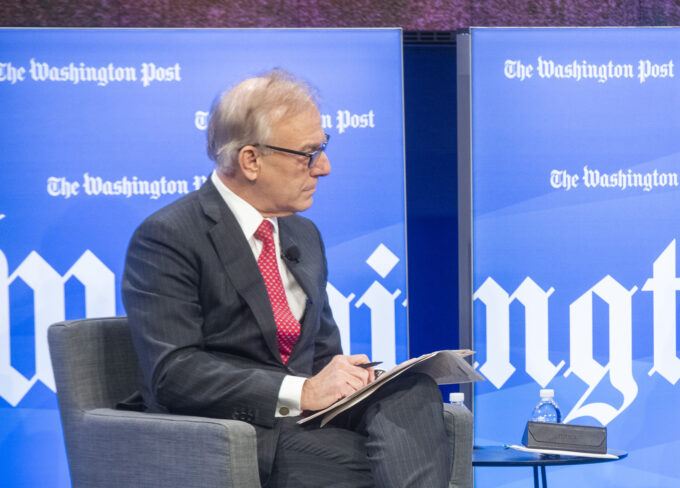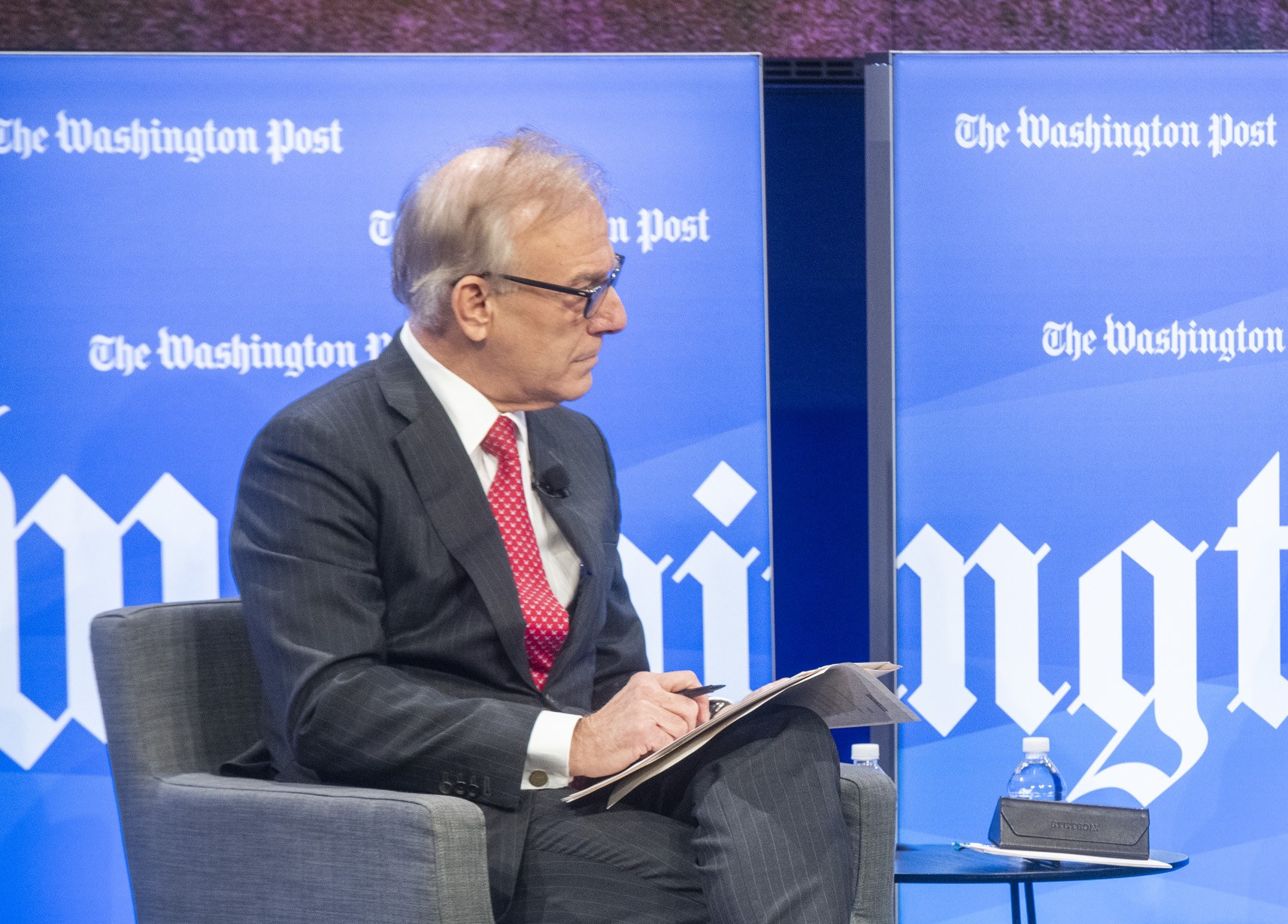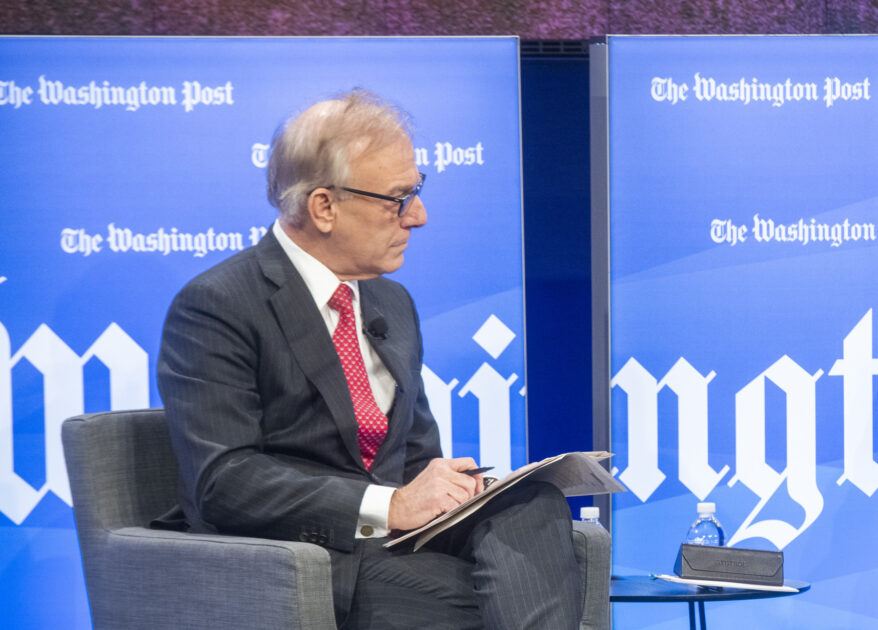This content originally appeared on Human Rights Watch and was authored by Human Rights Watch.
This post was originally published on Radio Free.
This content originally appeared on Human Rights Watch and was authored by Human Rights Watch.
This post was originally published on Radio Free.
This content originally appeared on The Real News Network and was authored by The Real News Network.
This post was originally published on Radio Free.































































Photograph Source: DoD photo by U.S. Air Force Staff Sgt. Marianique Santos – Public Domain
I attended Rashid Khalidi’s course, History of the Modern Middle East, 20 years ago and still think about it. Amid Columbia’s sea of polished and top-of-their-game scholars, Khalidi stood out as brilliant, and every lecture was exceptionally lucid and compelling. But beyond his talent as a lecturer, what was striking was how measured and sober, and even at times seemingly cautious, Khalidi was. He and other members of Columbia’s MEALAC department simply bore no resemblance to the right’s caricature of them. Insofar as their teaching was classifiable as “controversial,” it was not due to any ideology or temperament, let alone the defamatory bad faith accusation of anti-Semitism, but only because they were accurately chronicling an historical reality shaped by mass and ongoing atrocities perpetrated by the powers that be.
This then makes all the more striking Khalidi’s recent denunciation of Columbia’s capitulation to the Trump Administration’s attack on its students, employees, and academic freedom and free speech in general. Columbia, Khalidi writes, is Vichy on the Hudson, a fatally compromised collaborator that is a university in name only. While it is obviously the Trump Administration that is at the forefront of this breakneck authoritarian regression, it’s useful to remember that the historic attacks on the department and critics of Israel in general have always been a bipartisan affair. And it is the mutual culpability of this bipartisanship, giving lie to the shrill but facile Resistance to Trump 1.0, that prevents liberal institutions from effectively challenging the Trump Administration today.
The nature of the Democrats’ pulled punches is currently on vivid display over the imbroglio of the Trump Administration’s mishandling of classified communications preceding its attack on Yemen. Democrats and their media outlets surely cannot challenge Trump regarding the heart of the matter: the bombing of a foreign country and the killing of innocents. After all, it was the Democrats, under Barack Obama, who facilitated the war on Yemen both directly and via its Saudi attack dog. Similarly, Democrats cannot convincingly complain that the attack did not go through the “proper channels” or obtain congressional approval, as it was Obama who made a laughingstock of the War Powers Resolution by defending his refusal to request congressional approval for his war on Libya, claiming that it wasn’t in fact a “war,” a far more contemptuous, and deadly, semantic sleight of hand than even Bill Clinton’s notorious pronouncement that “it depends on what the meaning of the word ‘is’ is.” And of course Biden, his characteristically bankrupt promises notwithstanding, helped continue the onslaught in Yemen. Accordingly, the Democrats can do little else but seize the opportunity to put Trump on the defensive via the charge that he is an unreliable wielder of empire, i.e., the old “Reporting for duty,” more patriotic than thou, John Kerry script, as preposterously sanctimonious as it is ineffective.
Liberals’ proclamations of horror and outrage are not entirely insincere – how can they be considering the sheer bizarreness and surreal hubris of the Trump Administration’s shitstorm of slothful stupidity? Nevertheless, there is an unmistakable note of thou-protest-too-much in their railings, evoking a husband who screams at his wife because she left the rice out, displacing his real anger over the fact that she is sleeping with her co-worker, which he cannot express since he is busy sleeping with her friend.
The Democrats, as well as Columbia and more broadly all liberal institutions, are in on it and, it goes without saying, will not be coming to save us. We are alone to face a determined authoritarian movement that, notwithstanding its own weaknesses, will go as far it can in destroying human security, freedom, and dignity.
This is hardly a call to keep our heads down. On the contrary, to do so would be political and psychological suicide, a point eloquently expressed in Bruno Bettelheim’s 1960 essay in Harper’s Magazine, “The Ignored Lesson of Anne Frank.” The essay was controversial, as Frank had become a symbol of wartime virtue, and the perceived criticism of her family’s choices seemed cruel if not sacrilegious. But, in taking aim at the “universal admiration of their way of coping, or rather of not coping,” Bettelheim identified a great irony: those, like the Frank family, who thought they were doing the safe thing by going into hiding to wait out the nightmare were in fact likelier to be caught. Of particular consequence to Bettelheim were the psychological consequences of survivors’ wartime choices. Describing the experiences of others paralyzed by the harrowing circumstances of the war, Bettelheim writes:
As their desperation mounted, they clung more determinedly to their old living arrangements and to each other, became less able to consider giving up the possessions they had accumulated through hard work over a lifetime. The more severely their freedom to act was reduced, and what little they were still permitted to do restricted by insensible and degrading regulations imposed by the Nazis, the more did they become unable to contemplate independent action. Their life energies drained out of them, sapped by their ever-greater anxiety. The less they found strength in themselves, the more they held on to the little that was left of what had given them security in the past – their old surroundings, their customary way of life, their possessions – all these seemed to give their lives some permanency, offer some symbols of security. Only what had once been symbols of security now endangered life, since they were excuses for avoiding change. On each successive visit the young man found his relatives more incapacitated, less willing or able to take his advice, more frozen into activity, and with it further along the way to the crematoria where, in fact, they all died.
That is, the lesson the world drew from Frank’s story, “glorifying the ability to retreat into an extremely private, gentle, sensitive world,” was both self-serving and mistaken, an embrace of denialism and a refusal to confront a system that, at the seeming drop of a hat, can become devastatingly oppressive. On the contrary, those who chose to fight on principle and stuck their necks out, or who endured the sacrifices of escape, choices which appeared far riskier at the time, were in fact likelier not only to maintain their psychological integrity but to survive.
The post The Collapse of Liberalism appeared first on CounterPunch.org.
This content originally appeared on CounterPunch.org and was authored by Joshua Sperber.
This post was originally published on Radio Free.































































Photograph Source: Chairman of the Joint Chiefs of Staff – CC BY 2.0
For the past 20 years, the Washington Post’s David Ignatius has been the mainstream media’s leading apologist for the Central Intelligence Agency, and his latest editorial essay (“Intelligence analysts are still doing their job”) indicates he is loathe to yield his title. In reviewing the CIA’s “Annual Threat Assessment,” Ignatius falsely credits the CIA’s analysts with “giving priority to Trump’s concerns but not, so far as I could tell, fudging the facts.” In my 25 years as a CIA intelligence analyst, I often worked on these annual assessment and can assure readers that Ignatius is terribly wrong when he states that in these assessments “priorities can shift, for better or worse, depending on who’s in power.”
Ignatius is arguing that the annual assessments are politicized to some degree as a matter of course, but directors such as Richard Helms, William Colby, Adm. Stansfield Turner, and William Burns refused to engage in politicization. Directors such as William Casey, Robert Gates, and James Schlesinger tried to politicize assessments, but they were often challenged successfully. This year’s assessment is blatantly political and suggests that, like other agencies and departments of government in the Trump era, the CIA is not willing to tell truth to power.
The worst example of politicization in this year’s annual assessment is the fact that climate change was ignored as a critical threat to U.S. national security. For the past several years, one of the strong areas of agreement throughout the intelligence and military communities was the consideration that climate change was the number one threat to U.S. security. The Trump administration is damaging the work of Joe Biden’s Environmental Protection Agency, and the CIA is obviously paying no attention.
The softening of the language toward Russia suggests that CIA’s directorate of intelligence—now reporting to Director John Ratcliffe—decided to accommodate a new softer line on Russia. Ignatius argues that the “underlying analysis of Russia…is consistent with last year’s assessment.” Not true! From my past experience challenging the politicized views of William Casey and Robert Gates in the 1980s, I would guess (and hope) that there are intelligence analysts pushing back against Ratcliffe.
Last year’s assessment argued that Moscow “seeks to project and defend its interests globally and to undermine the United States and the west.” But this year’s assessment accommodates the Trump administration by arguing that the “west poses a threat to Russia,” and that the Kremlin’s objective “to restore Russian strength and security in its near abroad against perceived U.S. and western encroachment…has increased the risks of unintended escalation between Russia and NATO.” Last year’s assessment described Russia as a “resilient and capable adversary across a wide range of domains.” This year’s assessment refers to Russia as a “potential threat to U.S. power, presence and global interests.”
The threat assessment says nothing about disarmament, although Russia, China, Iran, and even North Korea have hinted that they are prepared to open talks with the United States regarding arms control. At the same time, the assessment makes matters worse by exaggerating the possibilities for “adversarial cooperation” among Russia, China, Iran, and North Korea. The CIA anticipates greater threats from each of them individually, posing new challenges to U.S. strength and power globally. It says nothing about dialogue and diplomacy with the group, which coincides with the Trump administration closing down the United States Institute for Peace, which has provided policy guidance in recent years over the possibility of such talks.
In addition to CIA’s tilting in the direction of Trump’s distorted views, we have Secretary of Defense Pete Hegseth reorienting U.S. military policy in a similar direction. And to make matters worse, the secret internal guidance from the Pentagon is in some places word-for-word duplications of text written at the Heritage Foundation last year. According to the Washington Post, the guidance outlines Trump’s vision for winning a potential war with China and for defending against such threats in the “near abroad” as Greenland and the Panama Canal. I participated in numerous war games at the CIA and the National War College over the years, and the United States was on the losing end of all of the encounters designed to defend Taiwan.
There are various examples in the threat assessment of truckling to Donald Trump. A major example is the assessment that the Israel-HAMAS conflict derailed the unprecedented
diplomacy and cooperation generated by the Abraham Accords. The assessment describes a “trajectory of growing stability in the Middle East.” This exaggerates the impact of the Abraham Accords, which Trump constantly praises, as well as the “trajectory of growing stability in the Middle East.” There was no such trajectory, particularly as a result of Israel’s right-wing government.
There are similar distortions throughout the assessment. Iran has taken a military beating since the Hamas attack of October 7th, but the CIA claims that Iran’s conventional and unconventional capabilities pose a threat to U.S. forces. There is the claim that the fall of President Bashar al-Asad’s regime at the hands of opposition forces led by Hay’at Tahrir al-Sham (HTS) has created conditions for extended instability in Syria. Actually, the emergence of HTS offers the first opportunity since 2011 for creating some political stability in Syria, and lifting U.S. sanctions against Syria could contribute to a diplomatic exchange between Washington and Damascus. It is the job of CIA to point to opportunities for U.S. diplomacy, and not just engage in worst-casing of the geopolitical environment.
The intelligence distortions from the annual threat assessment were presented at the same hearing before the Senate Intelligence Committee that heard blatant lies from Director of National Intelligence Gabbard and CIA Director Ratcliffe. It is David Ignatius’s job to expose these distortions and lies, but he is too busy obfuscating them.
In addition to ignoring climate change, there is another existential threat that neither the CIA nor the Pentagon is in a position to describe, which is the threat of having Donald Trump and his troglodytes in the White House for three and a half more years.
The post The Washington Post’s David Ignatius Remains the Leading Apologist for the CIA appeared first on CounterPunch.org.
This content originally appeared on CounterPunch.org and was authored by Melvin Goodman.
This post was originally published on Radio Free.
This content originally appeared on The Real News Network and was authored by The Real News Network.
This post was originally published on Radio Free.
Digging with their bare hands, rescuers in Myanmar have pulled several trapped people to safety in the days following a devastating 7.7-magnitude earthquake, videos circulating on social media show.
In one, a cell phone video taken by two teenage girls, ages 13 and 16, shows them trapped with their 75-year-old grandmother in the cramped darkness of a collapsed apartment building in Mandalay, a city near the epicenter of Friday’s quake.
“We’re trapped in here! We’re trapped in here!” one of them calls out desperately. One girl taps with something metallic on a concrete slab to signal to rescuers where they are.
Only the light of a mobile phone illuminates the claustrophobic scene. Briefly, we get a glimpse of the grandmother’s bloodied face.
Their cell phone signals reached residents, who worked feverishly to dig them out. Separate video footage shows a cluster of men lifting chunks of cement with their bare hands. “We’re ready to uncover them!” one shouts.
The final seconds of the footage shows the three being carried out of the rubble on stretchers on Sunday — a happy ending amid the gloom of the worst earthquake to hit Myanmar in decades.
The military-run country is ill-equipped to respond to the disaster. It is mired in a four-year civil war that has already displaced 3 million people.
So far, the quake has killed more than 3,000 people in Myanmar, according to the military junta that took power in a 2021 coup.
In another video, a 13-year-old girl named Pan Aye Chon is unearthed from the rubble of a collapsed monastery in Mandalay after three hours of digging by rescue workers.
While she survived the quake, family members say she’s heartbroken that many of her friends who were with her died.
When the shaking started midday Friday, the girl ran out of the monastery, but then turned around to go back to try to rescue her friends. Then part of the structure fell and trapped her, family members said.
In the capital, Naypyidaw, a 63-year-old woman was rescued from the rubble after being trapped for 91 hours, or nearly four days, Reuters reported.
Video showed orange uniform-clad rescuers in white helmets searching the partially collapsed remains of a building before the woman was carried out on a stretcher.
Reuters was able to confirm the location of the video as Naypyitaw from the buildings, the road layout and the entrance to the hospital, which matched satellite imagery of the area.
The date when the video was recorded could not be verified independently, Reuters said. However, a Myanmar Fire Services Department statement said the rescue took place on the morning of April 1.
Edited by Mat Pennington and Malcolm Foster
This content originally appeared on Radio Free Asia and was authored by RFA Staff.
This post was originally published on Radio Free.
This content originally appeared on The Real News Network and was authored by The Real News Network.
This post was originally published on Radio Free.
Comprehensive coverage of the day’s news with a focus on war and peace; social, environmental and economic justice.
The post The Pacifica Evening News, Weekdays – April 1, 2025 appeared first on KPFA.
This content originally appeared on KPFA – The Pacifica Evening News, Weekdays and was authored by KPFA.
This post was originally published on Radio Free.
This content originally appeared on The Real News Network and was authored by The Real News Network.
This post was originally published on Radio Free.
This content originally appeared on The Grayzone and was authored by The Grayzone.
This post was originally published on Radio Free.
If you thought SignalGate was bad, wait until you hear about ArchiveGate. Trump illegally fired the National Archivist—the first president in U.S. history to do so since the position was established in the 1930s. This wasn’t just about a change in leadership; it was revenge on the Archivist’s office alerting the DOJ about Trump’s stolen classified documents, which were stored around Mar-a-Lago, a known hub for foreign spies.
But it gets worse. Marco Rubio, who is currently the Trump/Putin lackey Secretary of State, is also serving as the acting National Archivist. This unprecedented conflict of interest raises serious concerns. Rubio is juggling three major roles—Secretary of State, head of USAID, and now, National Archivist. This gives him the power to greenlight the destruction of government records, including his own, without any checks and balances.
The National Archives and Records Administration (NARA) plays a vital role in maintaining the integrity of our political system, overseeing the administration of the Electoral College, preserving government records, and ensuring transparency. Now, with Rubio in control, we face the potential destruction of key documents and rewriting of history that could threaten our democracy. It’s another avenue for Trump to lead a coup to stay in power, like his failed “fake electors” scheme to try to overturn the 2020 election.
As one listener points out in her commentary, edited for clarity, shared in a recent Gaslit Nation salon, we must stay vigilant of these corrupt moves. ArchiveGate is part of a broader plan to hold on to power. But remember, the people are the ultimate force. Together, we can stop this.
Want to enjoy Gaslit Nation ad-free? Join our community of listeners for bonus shows, ad-free episodes, exclusive Q&A sessions, our group chat, invites to live events like our Monday political salons at 4pm ET over Zoom, and more! Sign up at Patreon.com/Gaslit!
Show Notes:
Reject Hypernormalization: Gaslit Nation Launches New Project, Survey https://www.gaslitnationpod.com/survey-reject-hypernormalization
Trump’s firing of the U.S. government archivist is far worse than it might seem: The National Archives and Records Administration does more than just preserve documents: It’s the scaffolding of the American political system. https://www.fastcompany.com/91277620/trump-firing-national-archivist-colleen-shogan
House Dems cite ‘fundamental conflict’ of Rubio’s acting appointments atop USAID and National Archives: Lawmakers’ concerns stem from a March 11 memo instructing USAID employees to prepare for mass destruction of agency records. https://www.govexec.com/management/2025/03/house-dems-cite-fundamental-conflict-rubios-acting-appointments-atop-usaid-and-national-archives/404013/
The ‘fake electors’ and their role in the 2020 election, explained https://www.washingtonpost.com/national-security/2023/07/20/fake-electors-charges-trump-2020-election/
This content originally appeared on Gaslit Nation and was authored by Andrea Chalupa.
This post was originally published on Radio Free.
This content originally appeared on VICE News and was authored by VICE News.
This post was originally published on Radio Free.
This content originally appeared on Democracy Now! and was authored by Democracy Now!.
This post was originally published on Radio Free.
This content originally appeared on ProPublica and was authored by ProPublica.
This post was originally published on Radio Free.
This content originally appeared on ProPublica and was authored by ProPublica.
This post was originally published on Radio Free.
This content originally appeared on The Progressive — A voice for peace, social justice, and the common good and was authored by Jacob Goodwin.
This post was originally published on Radio Free.


This story originally appeared in Labor Notes on Mar. 28, 2025. It is shared here with permission.
In his broadest attack on federal workers and their unions to date, President Donald Trump on Thursday announced an Executive Order that claimed to end collective bargaining rights for nearly the whole federal workforce. Early estimates have the move affecting 700,000 to 1 million federal workers, including at the Veterans Administration and the Departments of Defense, Energy, State, Interior, Justice, Treasury, Health and Human Services, and even Agriculture.
This gutting of federal worker rights has the potential to be a pivotal, existential moment for the labor movement. It is a step that recognizes that the Trump administration’s rampage against the federal government is hitting a roadblock: unions.
Much remains to be seen: How quickly will the government move to execute the order? How much of it will stand up to challenges in court? Members of the Federal Unionists Network (FUN), who have been protesting ongoing firings and cuts, are holding an emergency organizing call on Sunday, March 30.
The move echoes past attacks on federal and public sector unions, including President Ronald Reagan firing 11,000 striking air traffic controllers in 1981. Reagan’s move signaled “open season” on the labor movement, public and private sector alike.
The dubious mechanism that Trump is using to revoke these rights involves declaring wide swaths of the federal workforce to be too “sensitive” for union rights.
The Executive Order claims that workers across the government have “as a primary function intelligence, counterintelligence, investigative, or national security work.”
Historically the interpretation of this has been much narrower. While CIA operatives have not been eligible for collective bargaining, nurses at the Veterans Administration have. These rights have been law since the 1978 Civil Service Reform Act, and in various forms for years prior, starting with an executive order by President Kennedy in 1962.
For example, the Veterans Administration has the largest concentration of civilian workers in the federal government, with more than 486,000 workers. The Trump Executive Order declares all of them to be excluded from collective bargaining rights.
The order names 10 departments in part or in full, and eight other governmental bodies like agencies or commissions, ranging from all civilian employees at the Department of Defense and the Environmental Protection Agency to all workers at the Centers for Disease Control (a part of the Department of Health and Human Services) and the General Services Administration.
Federal unions immediately denounced the Executive Order, promising to challenge it in court. Everett Kelley, president of the American Federation of Government Employees, the largest federal union, said in a statement that AFGE “will fight relentlessly to protect our rights, our members, and all working Americans from these unprecedented attacks.”
It is unclear how quickly the federal government and its various agencies will act to nullify contracts and all that come with them.
At the Transportation Security Administration, where collective bargaining rights were axed in recent weeks, the impact was felt immediately: union representatives on union leave were called back to work, grievances were dropped, and contractual protections around scheduling were thrown out the window.
Some protests already in the works may become outlets for justified anger about the wholesale destruction of the federal labor movement.
Organizers with the FUN, a cross-union network of federal workers that has jumped into action as the crisis has deepened, are organizing local “Let Us Work” actions for federal workers impacted by layoffs and hosting the Sunday emergency organizing call March 30.
National mobilizations under the banner of “Hands Off” are also already planned for April 5.
This content originally appeared on The Real News Network and was authored by Joe DeManuelle-Hall.
This post was originally published on Radio Free.
This content originally appeared on Radio Free Europe/Radio Liberty and was authored by Radio Free Europe/Radio Liberty.
This post was originally published on Radio Free.
This content originally appeared on The Intercept and was authored by The Intercept.
This post was originally published on Radio Free.
This content originally appeared on Laura Flanders & Friends and was authored by Laura Flanders & Friends.
This post was originally published on Radio Free.
Two new Data for Progress surveys find that Democratic voters are deeply dissatisfied with party leadership and favor a more combative approach to opposing President Donald Trump. When asked to grade the Democratic Party’s response to Trump, 70% of Democratic voters gave the party a C or below, with 21% giving it an F.
The surveys, conducted among Democrats and Independents who lean Democratic, find that voters want a party leadership focused on fighting back against Trump and advocating for working-class Americans.
A strong majority of Democratic voters (61%) say Senate Minority Leader Chuck Schumer is not doing enough to oppose Trump, and 51% believe he lacks a clear, long-term strategy. After reading about Schumer’s vote in favor of the Republican spending bill, a majority (51%) of Democratic voters believe Senate Democrats should select a new leader, compared to just 34% who think Schumer should remain in his role.
“Democratic voters are sending a clear message: they want leaders who will fight Trump and put working people first,” said Danielle Deiseroth, Executive Director of Data for Progress. “The base is tired of weak opposition and business-as-usual politics. This level of discontent is unsustainable for a Party looking to build back in the wake of major losses — at a certain point, Democratic leaders will need to show voters that they are taking a stronger stance against Trump, or step aside for someone who will.”
Additional key findings:
Read the full polls here
.
This content originally appeared on Common Dreams and was authored by Newswire Editor.
This content originally appeared on Democracy Now! and was authored by Democracy Now!.
This post was originally published on Radio Free.
This content originally appeared on Democracy Now! and was authored by Democracy Now!.
This post was originally published on Radio Free.

The new documentary The Encampments, produced by Watermelon Pictures and BreakThrough News, is an insider’s look at the student protest movement to demand divestment from the U.S. and Israeli weapons industry and an end to the genocide in Gaza. The film focuses on last year’s student encampment at Columbia University and features student leaders including Mahmoud Khalil, who was chosen by the university as a liaison between the administration and students. Khalil, a U.S. permanent resident, has since been arrested and detained by immigration enforcement as part of the Trump administration’s attempt to deport immigrants who exercise their right to free speech and protest. “Columbia has gone to every extent to try to censor this movement,” says Munir Atalla, a producer for the film and a former film professor at Columbia.
We speak with Atalla; Sueda Polat, a Columbia graduate student and fellow campus negotiator with Khalil; and Grant Miner, a former Columbia graduate student and president of the student workers’ union who was expelled from the school over his participation in the protests. “Functionally, I was expelled for speaking out against genocide,” he says. All three of our guests emphasize their continued commitment to pro-Palestine activism even in the face of increasing institutional repression. The Encampments is opening nationwide in April.
This content originally appeared on Democracy Now! and was authored by Democracy Now!.
This post was originally published on Radio Free.

We’re joined by the four-time Grammy-winning musician Macklemore, a vocal proponent of Palestinian rights and critic of U.S. foreign policy. He serves as executive producer for the new documentary The Encampments, which follows last year’s student occupations of college campuses to protest U.S. backing of Israel’s genocidal assault on Gaza. He tells Democracy Now! why he got involved with the film and the roots of his own activism, including the making of his song “Hind’s Hall,” named after the Columbia student occupation of the campus building Hamilton Hall, which itself was named in honor of the 5-year-old Palestinian child Hind Rajab. Rajab made headlines last year when audio of her pleading for help from emergency services in Gaza was released shortly before she was discovered killed by Israeli forces. “We are in urgent, dire times that require us as human beings coming together and fighting against fascism, fighting against genocide, and the only way to do that is by opening up the heart and realizing that collective liberation is the only solution,” Macklemore says.
This content originally appeared on Democracy Now! and was authored by Democracy Now!.
This post was originally published on Radio Free.































































Photograph Source: Alan Turkus – CC BY 2.0
The well-prepared, abundantly funded Heritage Foundation’s Project 2025’s implementation overwhelms all that has come before. The ill-prepared, leaderless Democrats and opposition are stymied to stop it. No March on Washington like the 1963 March for civil and political rights or the 1967 March against the Vietnam War will slow down the Trump steamroll. Neither the high price of eggs nor Wall Street jitters have had any effect.
What to do? Could courts be the deciding factor to halt the United States slide towards fascism?
Rules are essential to any organized society. Ever since Hammurabi’s Code written laws have existed. Although the idea of rules may be a fiction unless they are physically implemented, their very existence since at least 1750 BC shows how societies have historically sought to govern themselves. When Donald Trump wrote on his Truth Social network last month; “He who saves his Country does not violate any Law,” he directly challenged the relevance of laws. The man who twice swore to uphold the U.S. Constitution placed his saving the country above the law. Trump’s attacks on the judiciary and its role in government checks and balances are more than a constitutional crisis; there is now a societal crisis between liberalism and fascism.
Having consensual rules and implementing them are fundamental to stable societies. The Dominican Republic, for example, has had 32 constitutions since its independence in 1844. The United States, on the other hand, has had one constitution since 1789; it is the oldest written national constitution in force in the world and has been amended only 27 times. The U.S. Constitution is the constitutional gold standard; it has had international influence. The 1848 Swiss Constitution, for example, is in many ways a cut and paste of the U.S. one, something my Swiss friends don’t like to admit.
The implementation of the written law or commonly agreed upon laws such as in the unwritten constitution of the United Kingdom separates liberal societies from fascist states. Fascism revolves around an authoritarian leader who believes he is the incarnation of the nation; someone who acts individually as if he had no obligations to obey society’s laws.
In a very short period of time, President Trump has shown that he has no intention to respect the rule of law and uphold the oath of office he took on January 20, 2025. An example: A federal judge ruled that the government should not deport Venezuelan men to El Salvador without due process. The deportation went ahead anyway. “If anyone is being detained or removed from based on the administration’s assertion that they can do so without judicial review or due process, the president is asserting dictatorial power and ‘constitutional crisis’ doesn’t capture the gravity of the situation,” a Columbia University law professor was quoted in The New York Times.
Trump then called for the impeachment of the judge who made the ruling. “If a President doesn’t have the right to throw murderers, and other criminals, out of our Country because a Radical Left Lunatic Judge wants to assume the role of President, then our Country is in very big trouble, and destined to fail!” Trump posted on Truth Social.
Supreme Court Chief Judge John Roberts, in an unusual public statement indirectly rebuking Trump’s threat, said that “For more than two centuries, it has been established that impeachment is not an appropriate response to disagreement concerning a judicial decision,” the Republican appointed Justice declared. “The normal review process exists for that purpose.”
Where will the confrontation between Trump and the judiciary lead? The federal judge, James Boasberg, moved to hold the government in contempt for not following his order. “The government again evaded its obligations,” he wrote. Not following judge’s decisions is a Trump Administration pattern. In refusing to provide Judge Boasberg with details of the mass deportation, the Department of Justice argued that “This is a case about the President’s plenary authority, derived from Article II and the mandate of the electorate,” and that “’[J]udicial deference and restraint’ are required to avoid undue interference with the Executive Branch.”
Republican Speaker of the House Mike Johnson also threatened the courts. “We do have authority over the federal courts,” he said at a press conference. We can eliminate an entire district court,” he boasted.
“The problem with this administration is not just acute episodes like what is happening with Judge Boasberg and the Venezuelan deportations,” another law professor was quoted in The Times’ article. “It’s a chronic disrespect for constitutional norms and for the other branches of government.”
Trump and Musk are moving to consolidate presidential power at the expense of the Constitution’s separation of powers. In addition to the deportation ruling, CNN reported; “[A] judge in Rhode Island hearing a dispute over a government-wide freeze…added a cautionary footnote: ‘This is what it all comes down to: we may choose to survive as a country by respecting our Constitution, the laws and norms of political and civil behavior…Or, we may ignore these things at our own peril.’ A judge in Seattle declared in a separate case; ‘It has become ever-more apparent that to our president, the rule of law is but an impediment to his policy goals.’”
As far as the case involving the United States Institute of Peace (USIP); DOGE and Washington D.C. police forcibly entered its building, evicting the USIP president George Moose and others. “I’m very offended by how DOGE has operated at the Institute and treated American citizens trying to do a job that they were statutorily tasked to do at the Institute,” District Judge Beryl Howell said. “I mean, this conduct of using law enforcement, threatening criminal investigation, using armed law enforcement from three different agencies … to carry out the executive order… with all that targeting probably terrorizing employees and staff at the institute when there are so many other lawful ways to accomplish the goals [of the executive order] …Why?” Howell asked. “Why those ways here — just because DOGE is in a rush?”
(For more information on the USIP case, you can listen to Rachel Maddow at https://www.tiktok.com/t/ZP82XFM5w/)
Whatever protests are organized against the MAGA president, whatever MAGA failures occur because of the price of eggs, inflation/recession or the downslide on Wall Street, the legal battles taking place warrant close attention. According to Bloomberg News, “[I]n the first four weeks of the new administration, at least 74 lawsuits were filed, and of those, 58 were brought in federal district courts in Washington, Boston, Seattle and suburban Maryland.”
Cases will soon reach the Supreme Court. Judges Amy Coney Barrett and John Roberts seem prepared to break with the conservative majority to join the three liberal judges. If that happens, there will be more than a just a constitutional crisis. The confrontation between Trump and the courts will be a tipping point between liberalism and fascism.
As Harvard Law Professor and constitutional expert Laurence Tribe eloquently stated in The Guardian; “The president, abetted by the supine acquiescence of the Republican Congress and licensed by a US supreme court partly of his own making, is not just temporarily deconstructing the institutions that comprise our democracy. He and his circle are making a bid to reshape the US altogether by systematically erasing and distorting the historical underpinnings of our 235-year-old experiment in self-government under law.”
The post Respect for the Law is the Strongest Weapon Against Fascism appeared first on CounterPunch.org.
This content originally appeared on CounterPunch.org and was authored by Daniel Warner.
This post was originally published on Radio Free.
This content originally appeared on The Grayzone and was authored by The Grayzone.
This post was originally published on Radio Free.
This content originally appeared on Radio Free Asia and was authored by Radio Free Asia.
This post was originally published on Radio Free.